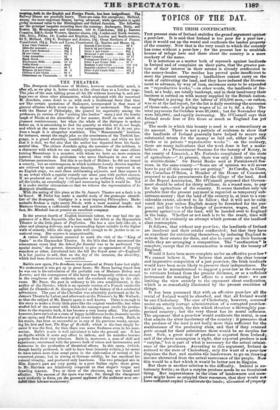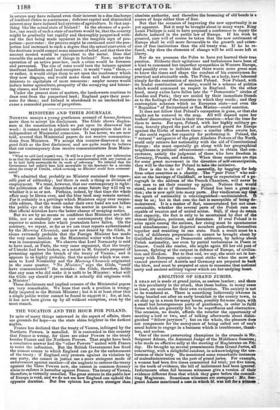TOPICS OF THE DAY.
THE IRISH CONFISCATION.
Tan present state of Ireland stultifies the grand argument against a poor-law. It is said that Ireland is too poor for a poor-law ; that it would eat up the rental and confiscate the landed property' of the country. Now that is the very result to which the connUr has come without a poor-law ; for the present law to establish-- houses of refuge here and there about the country is a mere mockery of the name. It is notorious as a matter both of reproach against landlord, in Ireland and of complaint on their parts, that the greater por- tion of their interest in their estates is already confiscated to the money-lender. The residue has proved quite insufficient to meet the present emergency ; landholders cannot carry on the work of cultivating the land' and they have induced the Govern- ment to advance, by way of loan, enormous sums to be expended on "reproductive works,"—in other words, the landlords of Ire- land, as a body, are totally bankrupt, and in their insolvency their business is carried on with money supplied by the British nations England is paying for the labour of 273,000 men,—or rather, was so at the last report, for the list is daily receiving the accession- of thousands,—and is giving wages of is. or Is. 3d. a day. The total payments for October were 97,000/.,• but for November they were 345,0004 and rapidly increasing. Mr. O'Connell says that Ireland needs four or five times as much as England has yet' given The mode in which this bounty is used is as extraordinary as its amount. There is not a particle of evidence, to show that the landlords of Ireland generally have helped to secure as, substantial return for the money so laid out, either in publk works or in private "reproductive works " : on the contrary, there are many indications that the work done is but a make; believe. At a Presentment Sessions for the barony. of Kenry, in the county of Limerick, a Mr. Fosbroke complained of the state of agriculture—" At present, there was only a little oats sowing in stubble-fields." Sir David Roche said at Patrickswell See, Mons, in the same county—" Some are of opinion we will never have to pay all this money we are getting." At Corofin, in Clare, Mr. Cornelius O'Brien, a Member of the House of Commons; proposed to make presentments for the tillage of the land. And at the Repeal Association, Mr. O'Connell proposed that Govern- ment should be asked for thirty millions, in a round sum, to pay for the agriculture of the country. It seems therefore only toe- probable that the present payment is regarded as temporary sub- sistence-money; that the land of the country is, at least to a con- siderable extent, allowed to lie fallow ; that it will not be culti- vated this year unless English money be furnished for the pur- pose; and that the whole charge of poor-rates, wages, and the general agriculture of the land, will be banded over to England in the lump. Whether or not such is to be the result, time will tell ; but it is evidently an attempt which persons. of the landlord- class contemplate. It follows, that without any poor-law, the landlords of Ireland' are insolvent and their estates confiscated ; but that they have an expedient for extricating themselves, by inducing England tb redeem their estates for them, and also to carry on their businees while they are arranging a composition. The "confiscation" It complete, except that its consummation is staid by the bounty of England.
Would it have been more complete under an effective poor-law t' We cannot believe it. We believe that under the clear lessons and imperative compulsion of a just poor-law, the Irish landlords would have been more likely to preserve their independence. Do' not let us be misunderstood to suggest a poor-law as the remedy to extricate Ireland from the present dilemma, or as a sufficient' instrument for restoring her affairs to a sound state : we art
limiting the view entirely to the argument about confiscatio
i ni which s so remarkably illustrated by the present condition of
things.
It has been presumed that with an effective poor-law all die rental of Ireland would be absorbed, and that all Ireland would be one Cholesbuq. The case of Cholesbury, however, occurredc under an utterly corrupt administration of a corrupted poor-law.. It exhibits, no doubt, the fate which threatens a thoroughly pau- perized country ; but the very threat has its moral influence. The argument that a poor-law would confiscate the rental, is ons that admits the utter insolvency of the country : itpreatunes that the produce of the land is not really more than sufficient for thd maintenance of the producing class; and that if they retained quite enough for their subsistence there would be no surplus fon rent. Now, a great deal of produce is exported from Ireland; and if the above assumption is right, that exported produce is not "surplus," but is part of what is necessary for the actual subsist- ence of the producers. According to this argument, Ireland le reduced to the state of Cholesbury, only the want of a poor-law disguises the fact, and enables the landowners to go on drawing income abstracted from the actual sustenance of the people. Now this would be a fact which it would be better not to disguise. But there is another solution to the difficulty. Ireland is no toriously fertile; so that a surplus produce needs be no fraudulent, thing. But improvidence in the class of landowners and maw piers might have so crippled their resources' that they would riot, have sufficient capital toscultivatethe lands ; alienation of property in estates may have reduced even their interest in a due discharge of landlord duties to a minimum ; deficient capital and diminished interest may have induced bad systems of agriculture. Is that any- thing like the actual state of Ireland? In the absence of a poor- law, one result of such a state of matters would be, that the country might be gradually but rapidly and thoroughly pauperized with- out the fact being made apparent in the tangible sign of pau- perism—Floor-rates : the process might be continued until the pau- perism had increased to such a degree that the actual starvation of the destitute would compel some measure of relief, and that then the amount needed would be equivalent to the rental. Does that resemble the actual state of things in Ireland? Now, under the operation of an active poor-law, such a crisis would be foreseen and prevented. The rise of rates svouk/ turn the balance against insolvent landlords and land-occupiers ; it would "ruin " them,— or rather, it would oblige them to act upon the insolvency which they now disguise, and would make them sell their remaining interests to capitalists of more resources : ampler means would induce better agriculture, prosperity of the occupying and labour- ing classes, and lower rates. -Under, the present state of matters, the landowners continue to draw rent from the pauperized land ; England pays their poor. rates for them ; and Ireland is abandoned to an unchecked be- cause' a concealed process of pauperism.



























 Previous page
Previous page